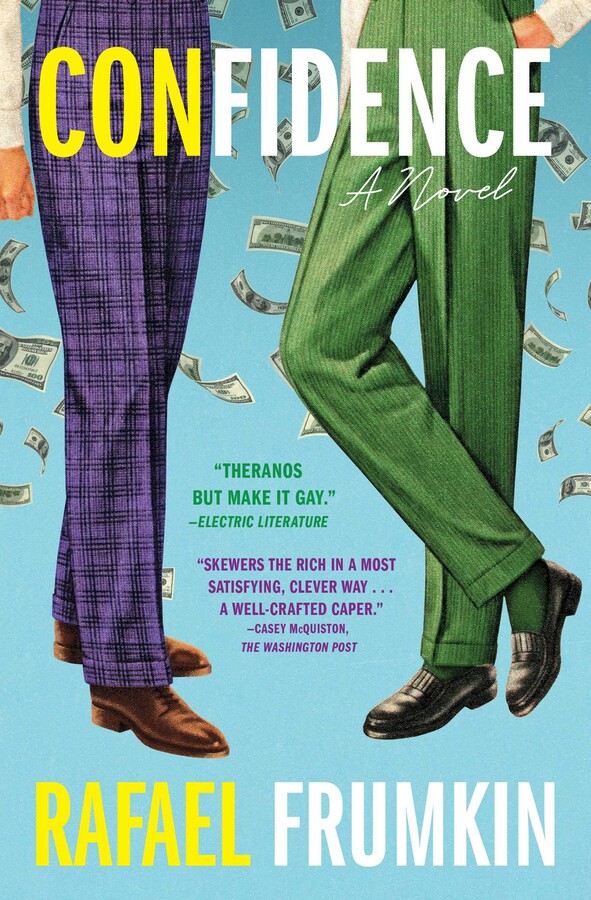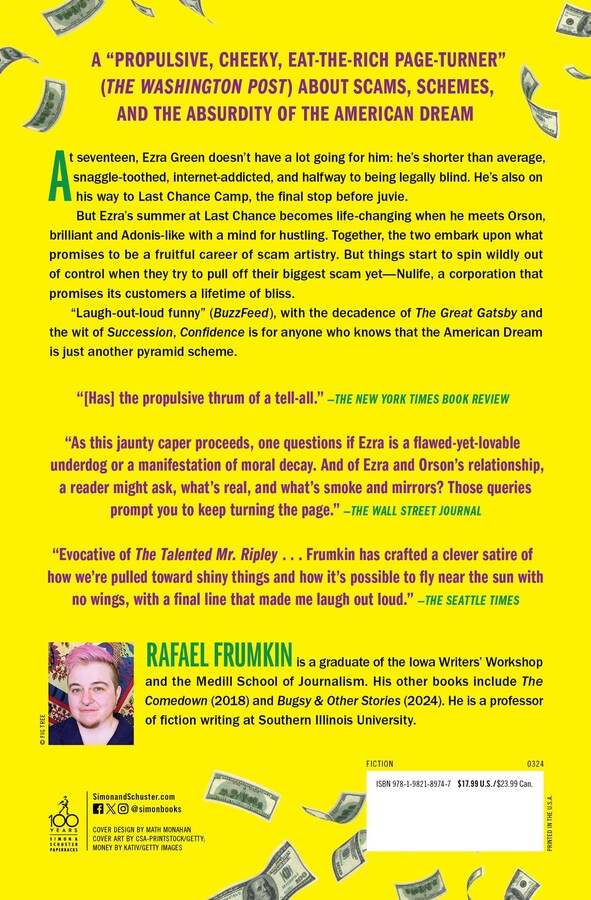Get our latest book recommendations, author news, competitions, offers, and other information right to your inbox.
Table of Contents
About The Book
Best friends (and occasional lovers) Ezra and Orson are teetering on top of the world after founding a company that promises instant enlightenment in this “propulsive, cheeky, eat-the-rich page-turner” (The Washington Post) about scams, schemes, and the absurdity of the American Dream.
At seventeen, Ezra Green doesn’t have a lot going on for him: he’s shorter than average, snaggle-toothed, internet-addicted, and halfway to being legally blind. He’s also on his way to Last Chance Camp, the final stop before juvie.
But Ezra’s summer at Last Chance turns life-changing when he meets Orson, brilliant and Adonis-like with a mind for hustling. Together, the two embark upon what promises to be a fruitful career of scam artistry. But things start to spin wildly out of control when they try to pull off their biggest scam yet—Nulife, a corporation that promises its consumers a lifetime of bliss.
“Propulsive” (The New York Times Book Review) and “laugh-out-loud funny” (BuzzFeed), with the suspense of The Talented Mr. Ripley, the decadence of The Great Gatsby, and the wit of Succession, Confidence is a story for anyone who knows that the American Dream is just another pyramid scheme.
Excerpt
IN PRISON, SMALL THINGS MATTER: a pencil, a banana, a packet of ramen. People studying for their GEDs got pencils; bananas were a rare commodity, meaning you had to be rich or smart if you were mashing one into your oatmeal; and ramen was so warm and filling, gave the eater such a sense of reassurance that people would trade cigarettes for it, or pay you to take their GED exams in exchange for five or six packets. You had to purchase the ramen from the commissary and then it would be “released” to you in the chow hall at the end of the meal. The inmates working in the kitchen would heat it up and give it to you in a little bowl with a plastic spoon, and you’d be allowed to take it back to your cell—or, if you were lucky, the TV room—to eat. Plastic spoons could be snapped in half and given rigid edges, so you had to be proven well-behaved to get to use one outside the chow hall. My cellmate once made a gash in someone’s forearm with the end of a plastic fork. He wasn’t allowed any utensils—instead he ate his food with his hands, which worked, because most of the food was congealed into cakey spheres that were easy to pick up and eat in a matter of bites. Unlike him, I had connections. I was eating macaroni and cheese when everyone else was eating meat loaf, brownies when everyone else was eating Jell-O.
Everyone was surprised by how well I fared in prison: it was kind of a joke, the little pretty kid is actually the meanest motherfucker in here. But, really, I wasn’t mean, nor was I particularly pretty. I was just focused on doing what I did best. I’d converted another inmate, Tyrell, to the magic of NuLife, and together we’d become business partners, Synthesizing members of the general population in exchange for loosies, ramen, drugs, shower privileges, protection, and sex. We held weekly informational meetings in the library that we pretended were AA meetings, bribing the COs with low-quality molly and oxy to go get high in the stacks and ignore us. We’d rearrange the demeaning twelve-step circle into rows and Tyrell and I would stand at the front, his lanky form towering over mine. Our first meeting was on a Wednesday night directly after chow, in those restless few hours when people tried to get drunk or pick fights before we had to return to our bunks.
“What’s NuLife?” Duke, who’d lost an eye in a botched bank robbery, wanted to know.
“NuLife is a way of turning matter into potential,” I said.
Tyrell gestured to the four walls enclosing us.
“Take this library,” he said. “The windows are barred. It’s only books in the stacks that’s supposed to be safe for convicts to read. You know what I mean by ‘safe’?”
Blank stares.
“Unlikely to provoke restlessness, awareness of our condition,” I chimed in. “Stifling independent thought. Prohibitive to freedom.”
“But with the power of NuLife, you can be free anywhere,” Tyrell said, nodding to me.
“You wake up every morning doubting yourselves and doubt yourselves until you go to sleep.” I began walking up and down the aisles, watching the inmates’ heads swivel to accommodate my movement. “You spend an inordinate amount of time living under the suspicion that you are frauds, undignified, unworthy of the special attentions and affections of others. On the outside, you labor in your jobs, assuming that if you make more money, you’ll be happier, and then of course you’re not happier. You deny yourselves bliss. You deny yourselves simple, beautiful, uncritical living. You hunger after betterness, and that hunger—even the betterness itself—makes for unhappiness.”
This is when Tyrell played dumb. He let out a little laugh and pulled at the collar of his uniform. “So how’re you planning to solve the problem of betterness?”
All eyes on me again, some bald heads gleaming with the ceiling’s fluorescence, some tattooed arms folded. It was incredible to have an audience like this, phone-less and understimulated, more rapt than any audience I could have had on the outside. This was my milieu.
“Synthesis,” I said.
A raised hand, this one from Al, who’d blown up a bar in which members of a rival gang were celebrating someone’s birthday. When I called on him, he slouched forward, forehead wrinkled thoughtfully, hands squeezed between his knees.
“I was wondering—maybe I missed this—but what’s Synthesis?”
“You didn’t miss anything, Al,” I said, and resumed my pacing. “It’s difficult to explain exactly what Synthesis is. I won’t even attempt to do it now. Suffice it to say that it rebuilds your memories and leaves you in a state of complete and uninhibited bliss. It gathers the shards of your self-worth up off the ground.”
“My self-worth?”
“See, you have to stop thinking on a big, macro scale,” I blazed ahead. “We all have traumas, right? But what are the specific moments that those traumas became most salient in our lives? You hate your dad? Okay great. But what was the one thing he did that made you hate him most? You’re scared of heights? Makes sense—so am I. Synthesis takes you back to the moment when you got stuck at the top of the Ferris wheel, or when you were peering over the cliff’s edge, or when you couldn’t climb down from that tree. It asks you to take sovereignty over those moments.”
“Sovereignty,” Tyrell repeated slowly, like a schoolteacher. “Basically, like, ownership.”
“You could say I’m the first beneficiary of Synthesis,” I said. “I’ve undergone it myself, and by now I’ve watched countless people undergo it, and believe me, it’s life-changing.”
I didn’t tell them about Orson: the little crack in his morning voice, his eyes meeting mine as we woke up, his smile anticipating my own, his hair matted from sleep. I didn’t tell them about the Farm, about the hundreds of people sitting cross-legged awaiting his appearance, listening with rapt devotion when he finally took the stage. And I certainly didn’t tell them about Orson being led away from me in handcuffs, shouting over his shoulder: Just hang on, Ez! We’ll be fine! How could I tell them about any of that? They wouldn’t have understood.
“After Synthesis, you’re left with the memory and none of the pain,” I said. “You’re left with the opposite of pain, actually.”
“Your self-doubt goes into remission,” Tyrell said, clearly aware that he was introducing a new vocabulary term. “That means it stops being active. You get free that way. And then you keep up the cycle: you get better by giving back. That means you gotta bring more people to NuLife, you gotta get them to join up. The bigger the NuLife family, the more freedom to go around.”
Duke looked skeptical. “How’d you get in here again?”
The question was clearly directed at me, but I acted confused anyway. “Me?”
He nodded.
“I knocked over a 7-Eleven,” I said. “I accidentally shot the clerk.”
“You shot the clerk?” This came from someone called D-Red, who had spent two months in solitary for nearly killing a CO with a lock in a sock.
“Yeah, man,” Tyrell said, stepping forward as though he were my counsel approaching the bench. “It’s true.”
“You don’t look like you could even handle a gun,” D-Red said.
“Nah, little homie can handle a gun,” Tyrell insisted.
“This isn’t about me,” I said quickly. “This is about NuLife and the radical power of Synthesis. This is about taking you all from the un-Synthesized to the Synthesized state and helping you reclaim your bliss.”
“Is this like finding God?” Al wanted to know.
“It’s a little like that, yeah,” Tyrell said. “But better.”
“Who wants to try it?” I asked. “It’s painless, and Tyrell here is one of the most gifted Synthesizers I’ve ever met.”
A few raised hands. I waited long enough to elicit a few more.
“Great,” I said. “We’ll just collect whatever you got.”
I walked up and down the aisles and they palmed me their contraband, some of which I tucked into the waistband of my uniform, some of which I swallowed on the spot. Then I nodded to Tyrell, who arranged two of the folding chairs across from each other and invited one of the willing to sit in the chair opposite him.
I took a seat in the back row as he Synthesized them, watching their trembling smiles and tears, applauding as each sprang from his seat to announce he’d been changed forever. Tyrell could elicit this kind of reaction without fail—he was better at it than me, even. But Orson had been the best at it. The way he’d lean forward and lace his fingers together, smile when the Synthesized smiled and sigh when the Synthesized sighed. He’d put a finger to his lips in thought and then say something spellbinding, something that could echo in your ears for hours or even days afterward.
There was nothing like it. There was no one like him.
Product Details
- Publisher: Simon & Schuster (April 11, 2024)
- Length: 320 pages
- ISBN13: 9781982189747
Browse Related Books
Raves and Reviews
One of the Washington Post’s 50 Best Works of Fiction of 2023 - A New York Times Editors' Choice Pick - One of them’s best books of 2023 - One of CrimeReads' Best Crime Novels of 2023
“Two boys meet at a camp for troubled kids who need to turn their lives around—it’s not the slammer, but it’s the last stop before it—and they start a scheme that indeed changes everything. Is it love? Is it lust? It’s a good time, that’s for sure.” –People
“Theranos but make it gay. In this Ripley-esque romp, two men—occasional lovers—create a fake empire based entirely on their own charisma and an impossibly auspicious wellness product that promises bliss to those who use it.”—Electric Literature
“Frumkin follows up his critically acclaimed debut The Comedown with Confidence, a biting satire about a pair of friends who start a company that promises consumers instant enlightenment for the rest of their lives…. Over the course of the novel, as their hustles become increasingly complex, they veer closer and closer to a massive collapse from which they may never recover.”—New York Magazine’s Vulture
Resources and Downloads
High Resolution Images
- Book Cover Image (jpg): Confidence Trade Paperback 9781982189747
- Author Photo (jpg): Rafael Frumkin Photograph © Rafael Frumkin(0.1 MB)
Any use of an author photo must include its respective photo credit







